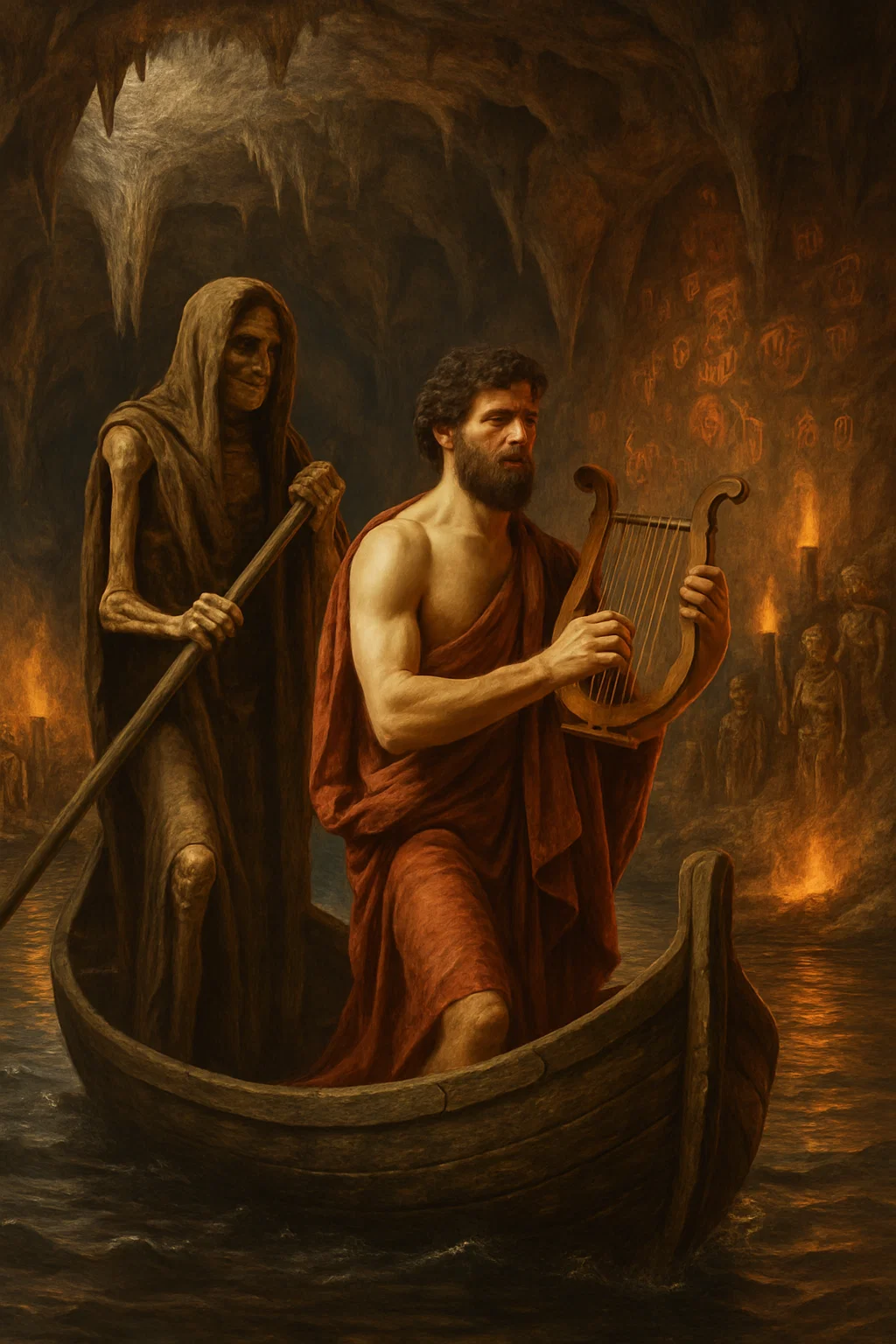
1. Interpreting the Myth
The myth of Orpheus and Eurydice transcends a simple love story. It explores the human will to overcome death, the boundaries of divine order and taboo, and questions the reach of artistic power. Unlike typical hero myths, Orpheus wields no weapon—his music and emotional persuasion alone move the realm of the dead. Though his journey ends in failure, it is seen not as defeat but as inevitable fate, leaving a deep philosophical echo.
2. The Poet Orpheus
Orpheus, a Thracian poet and musician, was believed to be the son of Apollo and the Muse Calliope. With his lyre, he could move not only humans and animals but even trees and stones. Among many myths, his role in the Argonaut expedition emphasizes the power of music in even war and voyage. As a mediator between gods and men, Orpheus embodies the ancient belief that art could reach divine realms.
Who is Calliope?
Calliope, the Muse of epic poetry, means "beautiful voice" in Greek (καλλιόπη, kalliope). She is often depicted holding a scroll and writing tablet.
3. Farewell Between Love and Death
Orpheus fell in love with the nymph Eurydice. Their pure and tranquil love was tragically short-lived—Eurydice died from a snakebite shortly after their wedding. In despair, Orpheus resolved to descend into the Underworld. In ancient thought, this was a realm forbidden to the living. His act symbolized a defiant challenge to divine law, with music as his only weapon.
4. Key Episode: Journey to the Underworld
With only his lyre, Orpheus journeyed to the land of the dead. He soothed Charon, the ferryman of the River Styx, and Cerberus, the three-headed guard dog, with music. Before Hades and Persephone, he sang of love and loss. His performance moved the rulers, and they granted him a unique condition—he could take Eurydice back, but he must not look back at her until reaching the surface.
Climbing the dark tunnel, Orpheus finally gave in to doubt and turned to see if Eurydice followed. In that instant, she vanished back into shadow. This scene lays bare the tension between trust and fear, divine order and human impulse. He lost her a second time—and this time forever. Forbidden from returning to the Underworld, he lived out his days remembering her through music.
5. The Underworld and Taboo
The Underworld represents irreversibility of death. Orpheus's descent was a symbolic breach of sacred boundaries. The command "do not look back" tested emotional discipline and trust. The myth implies that human emotion is inevitable and often leads to renewed loss. This journey becomes a metaphor for accepting mortality.
6. Symbolism and Power of Music
This myth tests how far music can go. Orpheus's lyre moved reality itself—it persuaded even gods and death. Yet it could not conquer his own emotion. Art, then, comforts and purifies but does not override fate. Orpheus is the embodiment of art, and his myth raises deep questions about love and artistic power.
7. Orpheus in Modern Culture
Today, his story is reimagined in films, operas, and theater. The command "do not look back" symbolizes human nature. Though a failed attempt, his story remains deeply moving—a metaphor for the artist’s struggle and the enduring nature of love. Orpheus is no longer a perfect hero, but a human who chose love despite sorrow.
Character Table
| Character | Role | Significance |
|---|---|---|
| Orpheus | Poet, Musician | Opened the gates of the underworld with his lyre; symbolizes both art and emotional limitation |
| Eurydice | Wife | Tested the essence of love through death; central to the tragedy |
| Hades | God of the Underworld | Guardian of death’s order; moved by emotion to allow exception |
| Persephone | Queen of the Underworld | Sympathetic goddess who supported Orpheus’s plea |
| Charon | Ferryman of Hades | Only carries the dead; swayed by Orpheus’s music |
'고전의 확장 > Greek & Roman Mythology' 카테고리의 다른 글
| Episode 29: Pygmalion and Galatea – The Man Who Created His Ideal (0) | 2025.09.08 |
|---|---|
| Episode 28: Daedalus and Icarus – Desire Toward the Sun (0) | 2025.09.07 |
| Episode 26: Andromeda and Perseus – A Love Written in Stars (0) | 2025.08.07 |
| Episode 25 – Perseus: The Hero Who Held Medusa's Head (0) | 2025.08.04 |
| Episode 24 – Bellerophon and Pegasus: The Tragedy of a Skybound Hero (0) | 2025.08.02 |



